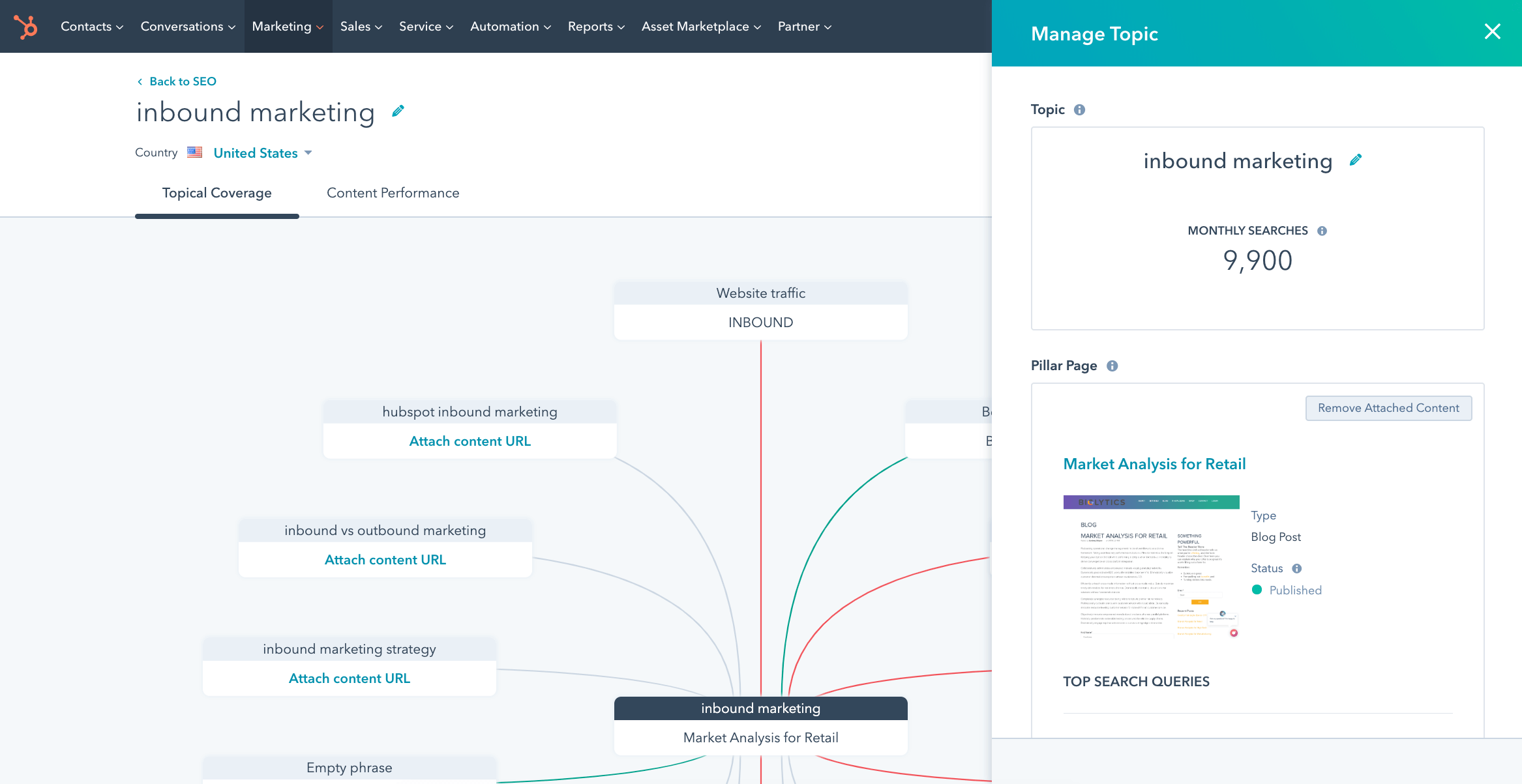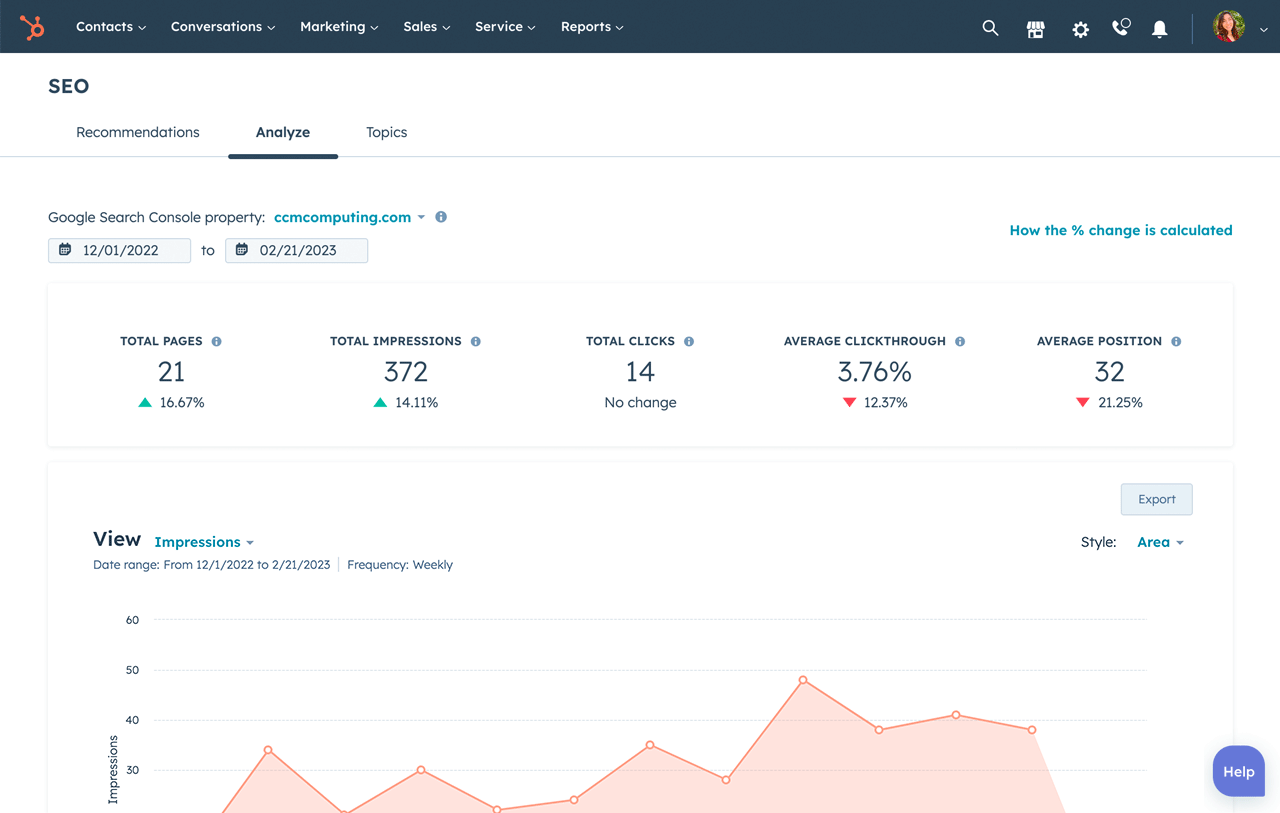Services List
In the competitive digital landscape, businesses need to ensure their websites rank well in search engine results to attract and retain visitors. HubSpot CMS provides a variety of built-in tools and features designed to help you optimise your website for SEO. In this article, we'll explore how to leverage HubSpot CMS to boost your search engine rankings, create engaging content, and enhance your website's overall performance.

Covered in this article
Keyword Research and Targeting
On-Page SEO Optimisation
Content Creation and Optimisation
Technical SEO
Off-Page SEO and Backlinks
Local SEO
Tracking and Analysing Performance
An Overview Of Optimising Your Website for SEO with HubSpot CMS
Optimising Your Website for SEO FAQs
Keyword Research and Targeting
The foundation of effective SEO is built on thorough keyword research. Identify relevant keywords and phrases that your target audience is searching for, and use them strategically throughout your content. HubSpot's built-in keyword research tool can help you find the right keywords to target based on search volume, competition, and relevance to your business.
Once you have identified your target keywords, incorporate them into your content in a natural and meaningful way. Include your primary keyword in your title, URL, headers, meta description, and throughout your content. However, avoid keyword stuffing, as it can lead to penalties from search engines.
On-Page SEO Optimisation
HubSpot CMS simplifies on-page SEO optimisation with its built-in SEO tools. These tools automatically analyse your content and provide recommendations to improve your search engine rankings. Some key on-page SEO elements to focus on include:
-
Meta Descriptions: Craft compelling meta descriptions that accurately summarise your content and include relevant keywords. This will improve click-through rates from search engine results pages (SERPs).
-
Header Tags: Use header tags (H1, H2, H3) to structure your content and make it more accessible to both users and search engines.
-
Image Optimisation: Optimise your images by compressing them, adding descriptive alt text, and using descriptive file names.
-
Internal Linking: Create a well-structured internal linking strategy that helps users navigate your site and enhances the overall user experience.
-
Mobile Responsiveness: Ensure your website is mobile-friendly, as search engines prioritise mobile-optimised websites in their rankings.
-
Page Speed Optimisation: Improve your website's loading speed by compressing images, minimising CSS and JavaScript files, and leveraging browser caching.
Content Creation and Optimisation
Creating high-quality, engaging content is crucial for improving your search engine rankings. Focus on producing content that addresses your audience's needs, questions, and pain points. Use HubSpot CMS's content editor to format your content for readability, incorporating header tags, bullet points, and images to break up text and enhance user experience.
Monitor your content's performance using HubSpot's analytics tools, and continually refine your content strategy to improve your search engine rankings.

Technical SEO
HubSpot CMS handles many technical SEO aspects automatically, but it's still essential to be aware of them. Some key technical SEO factors to consider include:
-
XML Sitemaps: Ensure your website has an up-to-date XML sitemap that's submitted to search engines, helping them crawl and index your content.
-
Robots.txt: Use a robots.txt file to control how search engine crawlers access and index your website.
-
Structured Data: Implement structured data markup to provide search engines with additional information about your content, improving your chances of appearing in rich snippets or other SERP features.
-
HTTPS: Secure your website with HTTPS, which is a ranking factor for search engines.
Off-Page SEO and Backlinks
Building high-quality backlinks is a crucial component of off-page SEO. Reach out to authoritative websites in your niche and request guest posting opportunities or collaborations. Additionally, create shareable content that others will naturally want to link to.
Monitor your backlink profile using HubSpot's backlink analysis tool and continually work on acquiring high-quality links to improve your search engine rankings.
Local SEO
For businesses with a local presence, optimising your website for local SEO is essential. Use HubSpot CMS to ensure your website contains accurate and consistent contact information, including your business's name, address, and phone number (NAP). Create localised content that appeals to your target audience in a specific area and incorporate local keywords into your content and metadata.
Claim and optimise your Google My Business listing and encourage customers to leave reviews, as this can impact your local search rankings. Use structured data markup for local businesses to provide search engines with additional information about your business, such as your location, hours of operation, and services offered.

Tracking and Analysing Performance
Monitor your website's SEO performance using HubSpot's built-in analytics tools. Track key metrics like organic traffic, conversions, and keyword rankings to gain insights into your SEO efforts' effectiveness. Use these insights to identify areas for improvement and adjust your strategy accordingly.
SEO is an ever-evolving field, and it's essential to stay informed about the latest trends and algorithm updates. Follow industry news, participate in forums, and attend webinars to keep your SEO knowledge up to date. As search engine algorithms change, be prepared to adapt your strategy and continue optimising your website to maintain and improve your search engine rankings.
An Overview Of Optimising Your Website for SEO with HubSpot CMS
Optimising your website for SEO with HubSpot CMS is an ongoing process that requires research, strategy, and regular adjustments. By leveraging the platform's built-in tools and features, you can boost your search engine rankings, create engaging content, and enhance your website's overall performance. As you continue to refine your SEO strategy, you'll be well-equipped to drive more organic traffic, attract your target audience, and grow your online presence with HubSpot CMS.
Optimising Your Website for SEO FAQs
1. How do I optimise my website?
To optimise your website, focus on the following key areas:
- Conduct keyword research to identify relevant keywords for your target audience.
- Implement on-page SEO by optimising meta descriptions, header tags, images, and internal linking.
- Create high-quality, engaging content that addresses your audience's needs and questions.
- Improve technical SEO by ensuring an up-to-date XML sitemap, implementing structured data, and securing your website with HTTPS.
- Build high-quality backlinks through guest posting, collaborations, and creating shareable content.
- Optimise your website for local SEO if you have a local presence.
- Track and analyse your website's performance using analytics tools and adjust your strategy accordingly.
- Stay informed about the latest SEO trends and algorithm updates, and adapt your strategy as needed.
2. How can I optimise my SEO for free?
To optimise your SEO for free, leverage the following tactics:
- Use free keyword research tools, like Google Keyword Planner or Ubersuggest, to identify target keywords.
- Implement on-page SEO best practices, such as optimising meta descriptions, header tags, and images.
- Create high-quality, engaging content that addresses your audience's needs and questions.
- Improve your website's loading speed using free tools like Google PageSpeed Insights or GTmetrix.
- Reach out to authoritative websites for guest posting or collaboration opportunities to build backlinks.
- Claim and optimise your Google My Business listing.
- Track your website's performance using free analytics tools, like Google Analytics or HubSpot's free tools.
3. How to do SEO for a website step by step?
Follow these steps to perform SEO for your website:
-
Conduct thorough keyword research.
-
Optimise your website's on-page SEO elements, such as meta descriptions, header tags, images, and internal linking.
-
Create high-quality, engaging content that addresses your audience's needs and questions.
-
Improve technical SEO by ensuring an up-to-date XML sitemap, implementing structured data, and securing your website with HTTPS.
-
Build high-quality backlinks through guest posting, collaborations, and creating shareable content.
-
Optimise your website for local SEO if you have a local presence.
-
Track and analyse your website's performance using analytics tools and adjust your strategy accordingly.
-
Stay informed about the latest SEO trends and algorithm updates, and adapt your strategy as needed.
4. How do I optimise my website for SEO in 8 simple steps?
Here are eight simple steps to optimise your website for SEO:
- Conduct keyword research to identify relevant keywords for your target audience.
- Implement on-page SEO by optimising meta descriptions, header tags, images, and internal linking.
- Produce high-quality, engaging content that addresses your audience's needs and questions.
- Improve technical SEO by ensuring an up-to-date XML sitemap, implementing structured data, and securing your website with HTTPS.
- Build high-quality backlinks through guest posting, collaborations, and creating shareable content.
- Optimise your website for local SEO if you have a local presence.
- Track and analyse your website's performance using analytics tools and adjust your strategy accordingly.
- Stay informed about the latest SEO trends and algorithm updates, and adapt your strategy as needed.






